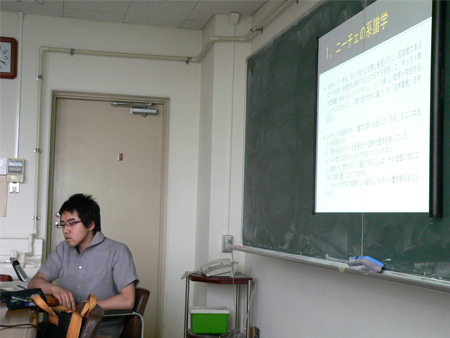中期教育プログラム「脳科学と倫理」セミナー(3)第9回報告
中期教育プログラム「脳科学と倫理」についてご報告します.
今回の報告はセミナー (3)「Prinz "The Emotional Construction of Morals" を読む」の第9回.第6章 “The Genealogy of Morals” を検討しました.
【プレゼンテーション】 小口峰樹さん (UTCP若手研究員)
Prinz's The Emotional Construction of Morals". 第6章 'The Genealogy of Morals' PDF (451KB)
【報告】 佐藤亮司さん (若手研究員)
In session 9. we read chapter 6: The Genealogy of Morals. Prinz discussed Nietzsche’s genealogy and modified it to use it as a critical tool for our moral values. Nietzsche criticized Christian values by revealing their ignoble origin.* According to him, Christian values, such as asceticism, charity, and chastity, are not so sublime as Christians believed. In fact, these came from Christians’ resentment against the ancient Roman who oppressed the early Christianity. Nietzsche insisted that we should abandon unnatural Christian values, and adopt more natural values which the ancient Roman embraced. Nietzsche’s genealogy has been frequently criticized until now. Some criticized that it conflicts with historical facts: Nietzsche’s genealogy is a mere speculation. The other criticized it for its genetic fallacy: the origin of values has nothing to do with their truths. But Prinz claimed genealogy is useful in two ways. First, we can investigate the origin of our values by genealogy. Second, as I mentioned above, we can use it as a critical tool for our morality.

For the first purpose, Prinz introduced the concept of “fitness”. Fitness is a property of an evaluative belief, which is defined in terms of the probability that the belief is culturally transmitted. If the fitness of a belief is high, the probability becomes high. Fitness has three factors: material, narrative, and emotional ones. Prinz named his genealogy “naturalized genealogy” and explained cannibalism and Christian monogamy in terms of fitness in 6.2.3 and 6.2.4. He gave a caution that his theory of “fitness” is not the same as an evolutionary one. On page 222, he raised four disanalogies between the ideas of fitness in cultural transmission and in evolutionary biology. But in our view, two of them do not really matter. Prinz argued that beliefs are not formed by “random mutation”. He also claimed beliefs are not transmitted by “replication”. But it seems there are “random mutation” and “replication” of beliefs”. Consider the telephone game. She/he mechanically tells the next person what she/he heard from the previous person. But the transmitted sentence is frequently changed from the original. The sentence was suddenly changed, just like a random mutation. We argued that the telephone game is not a deviant example of the transmission of beliefs. We often have a belief without any deliberation. Thus, we concluded the fitness of a belief is not so far from fitness in evolutionary biology.
For the second purpose, Prinz carefully tried to avoid the genetic fallacy. He proposed a moderate thesis. He said, “If a belief in a moral value emerged as a consequence of ignoble historical events, then we should consider abandoning that belief” (p. 239; italics in the original). Historical events are ignoble when the spread of a moral value did not bring any obvious benefit to moralizers. We should consider whether a belief is currently beneficial, if its ignoble origin is exposed. Prinz claimed Christian monogamy might be the consequence of ignoble historical events. Christians’ preference for monogamy is instilled by the early Church which intended to confiscate real-estate whose heir did not exist. This ignoble origin prompts us to reconsider monogamy. Prinz concluded there is no reason to abandon monogamy, but there is also no reason to forbid polygamy when considering our current benefit. After all, I have to note that this thesis does not commit the genetic fallacy. It has nothing to do with the truth of a belief, and it recommends us to reconsider current benefit of the belief on the basis of historical events. Prinz’s genealogy can work as a critical tool without any problem.
It seems to me this chapter is important for defending relativism, although Prinz did not explicitly mention this point. This is because relativism sounds like the anything-goes thesis. Suppose our moral sentiments are the products of institutional or governmental conspiracy as Christian monogamy in this chapter. According to Prinz, having corresponding sentiments is enough for moral judgments to be true. But it seems counter-intuitive if there is no method to revise such values. We should reconsider our values once the conspiracy is revealed. Genealogy proposed here enables us to revise our moral values in the light of relativism.
* Nietzsche, F. W. (1887/1967). On the Genealogy of Morals, trans. W. Kauffman. New York, NY: Random House.

PDF版をダウンロード⇒
【レポート】Prinz's The Emotional Construction of Morals". 第6章 'The Genealogy of Morals' PDF (41B)






